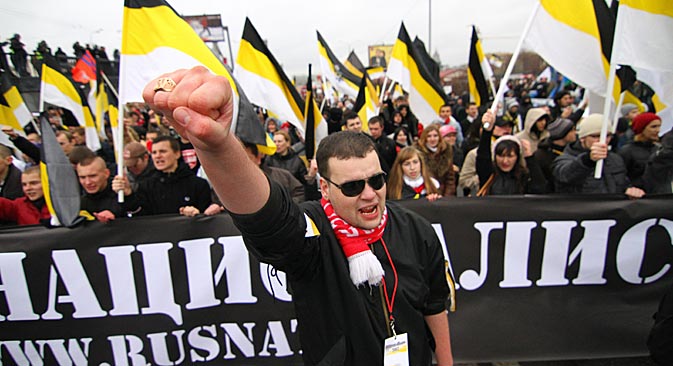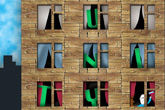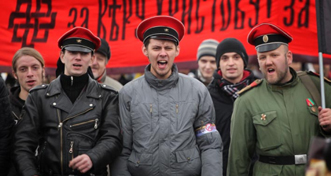Russian nationalists will hold anti-immigrant march on Unity Day

Organizers of Russian March in the Moscow district of Lublino expect to draw 30,000 people. Source: ITAR-TASS
Russian nationalist groups will demonstrate in cities across Russia on Nov. 4, the country’s Unity Day, in an annual event that in previous years has sparked clashes between law enforcement officials and ultra-nationalist groups shouting anti-immigrant slogans.
Organizers of Russian March, as the participating groups are calling it, said they have obtained permits to hold the demonstrations in Moscow, Arkhangelsk, Volgograd, Voronezh, and Yekaterinburg.
Thegroups were unable to obtain permission to demonstrate in St. Petersburg because of disagreements over the location. Organizers had hoped to bring the event to 100 cities but have been unable to get all the necessary permits.
In Moscow, authorities will allow the demonstration in Lublino in the southeastern region of the capital. Organizers expect to draw 30,000 people. Five thousand police officers will patrol the event.
Nationalist groups have used Russia’s Unity Day as their annual marching event since 2005, when Pres. Vladimir Putin created the public holiday to replace the former Soviet celebration of the Great October Socialist Revolution.
Related:
November 4 events in Moscow expected to draw up to 25,000
Unity Day marks the expulsion of Polish forces from Moscow in the autumn of 1612, an event that was celebrated in Russia until1917, when it was changed tocommemorate the Russian Revolution.
Recent polls have shown that most Russians see the newly createdUnity Day holiday as just an “additional day of rest” and have no ideological ties to the day.
The first Russian March took place in 2005 with about 3,000demonstrators in Moscow and about 300 in St. Petersburg. Nationalist youth groups tookto the streets with slogans such as “Glory to Russia!” and “Russia is for Russians,” and chanted anti-immigrant and anti-Semitic slogans.
Citizens and officials in both capitals were unnerved by the event, and the following year the authorities of both cities officially forbade the marches, sparking numerous clashes of nationalists with law enforcement officials and detentions.
During subsequent years, other Russian cities began to join the organized march, and the number of participants increased.As many as 10,000 people have taken part in the Moscow march in recent years.
This year, Moscow authorities denied Russian March organizers access to the city center for the event, fearing a repeat of last month’s clashes between nationalists, migrant workers and the police in the area of Biryulevo in southern Moscow.
This year’s organizers said the event will promote issues such as acknowledging Russians as nation-building people; introducing visa regimes for the countries of Central Asia; fighting against illegal migration; developing sport and fighting against alcoholism in Russia; and urging Russia’s withdrawal from the World Trade Organization.
All rights reserved by Rossiyskaya Gazeta.
Subscribe
to our newsletter!
Get the week's best stories straight to your inbox

